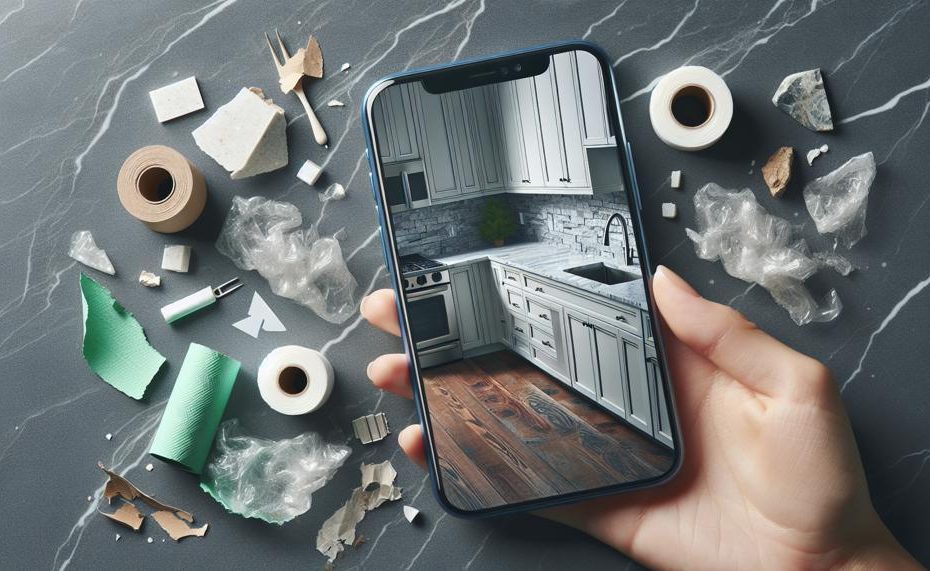Are you ready to revamp your kitchen or bathroom with a touch of elegance and sustainability? This eco-friendly option not only adds a stylish touch to your space, but also reduces your carbon footprint and promotes a circular economy. So, can you recycle quartz countertops?
Yes, quartz countertops can be recycled. Quartz is a man-made, non-porous material that’s resistant to pathogens and toxic substances. Recycling quartz can help reduce waste generation.
Here are some ways to recycle quartz:
- Some manufacturers: May accept quartz for repurposing or making other products
- Local salvage facilities: May accept quartz countertops
- Nonprofits: May sell used building materials, including quartz countertops
Keep reading our blog post below for more insights on recycling quartz countertops and how it can benefit both your home and the environment.
Contents
What are Quartz Countertops Made of?
When it comes to quartz countertops, the ingredients are natural quartz, resins, and pigments. The combination of these materials creates a durable, non-porous surface that is resistant to stains and scratches.
The process of making quartz countertops involves mining pure white quartz from the earth, grinding it into different sizes, and then mixing it with a binder before baking it at high temperatures.
The end result is slabs that are denser than traditional granite and have a consistent pattern.
Are Quartz Countertops Recyclable?
Recycling quartz countertops is a multi-step process that involves carefully removing them from your kitchen or bathroom, breaking them down into smaller pieces, crushing them into a fine powder, and then combining them with resins and pigments to create brand new slabs.
This innovative method not only helps to reduce the amount of waste in landfills, but it also conserves valuable resources by eliminating the need for new mining of natural quartz.
Not only is recycling quartz countertops an environmentally friendly option, but it also has other positive impacts on the environment. By choosing to recycle, harmful pollutants are not released into the environment, and the negative effects of mining on the ecosystem are minimized.
Additionally, recycling requires far less energy than the production of new slabs, making it a more sustainable choice.
How to Recycle Quartz Countertops
There are various methods available for recycling quartz countertops, depending on the accessibility of resources and facilities. Proper disposal is crucial to minimize waste and preserve natural resources. Here are some options to consider:
- Recycling: One can recycle quartz countertops by breaking down the slabs and reusing the crushed material in other applications. This is a great way to reduce waste and conserve natural resources.
- Repurposing: If recycling is not possible, repurposing can serve as an alternative. Old or damaged countertops can be utilized for DIY projects like creating mosaic tiles or garden stepping stones.
- Donation: In certain cases, quartz countertops may still be in good condition and can be donated to organizations or individuals in need of building materials. This not only helps reduce waste but also contributes to the community.
- Landfill disposal: As a last resort, quartz countertops can be disposed of in landfills. However, this should only be done when all other options have been exhausted, as it contributes to environmental pollution and depletion of natural resources.
To ensure proper disposal of quartz countertops, follow these steps:
- Contact local recycling facilities or contractors to inquire about their capabilities for handling quartz countertops.
- If recycling is not possible, consider repurposing or donating the countertops.
- If none of these options are available, dispose of the countertops responsibly by contacting local waste management authorities for proper disposal guidelines.
- Ensure that any remaining resin or adhesive is removed before disposing of the countertops.
- Consider the environmental impact and costs associated with each disposal option before making a decision.
Quartz Countertop Recycling Challenges
Quartz is a widely used mineral that is found in various industries and everyday items. However, recycling quartz countertops poses a unique set of obstacles due to its composition and the energy-intensive processes involved in its extraction and manufacturing.
Here, we will delve into the main challenges of recycling quartz countertops and explore potential solutions to overcome them.
Composition:
The foremost challenge in recycling quartz countertops lies in their composition. Engineered quartz consists of natural crystals bound together with resin, making it challenging to separate these two components for recycling.
The resin component is non-biodegradable and can only be broken down through a chemical process, which is currently not feasible on a large scale.
Solution:
One possible solution to this challenge is to develop more efficient and cost-effective methods for separating the natural crystals from the resin. This would require advancements in technology and research in the field of materials science.
Additionally, companies could consider using alternative materials for binding, such as biodegradable resins, to make recycling more viable.
Energy Intensive Processes:
The extraction, processing, and manufacturing of quartz countertops also contribute to the difficulty of recycling.
These processes are highly energy-intensive and require a significant amount of resources, further exacerbating the environmental impact of quartz countertops.
Solution:
One way to address this challenge is to reduce the demand for new quartz countertops by promoting sustainable alternative materials that are easier to recycle. This could include natural stone options like granite or recycled materials like glass or metal.
Another solution could be implementing more sustainable practices in the extraction and manufacturing processes, such as utilizing renewable energy sources.
Harmful Substances:
During the manufacturing process of quartz countertops, there are concerns about the release of harmful substances into the environment. This adds another layer of complexity to potential recycling efforts.
Solution:
To tackle this challenge, companies could invest in more environmentally friendly manufacturing processes that reduce or eliminate harmful byproducts.
Additionally, proper disposal methods for these substances should be implemented to prevent further harm to the environment.
Alternatives to Recycling Quartz Countertops
Unfortunately, recycling quartz countertops is not a feasible option due to technical and economic constraints.
However, there are various eco-friendly alternatives that can be utilized to reduce the environmental impact of using quartz in construction and design.
Metal Countertops:
Metal countertops, such as stainless steel and copper, are durable and recyclable options that can replace quartz. These materials are also non-porous, making them resistant to stains and bacteria.
Additionally, metal countertops can be repurposed or recycled at the end of their lifespan, contributing to a more sustainable circular economy.
Recycled Glass Countertops:
Recycled glass countertops are a great alternative to quartz. They are made from post-consumer and industrial waste glass, reducing the need for new raw materials.

The manufacturing process also requires less energy compared to producing engineered quartz, making it a more sustainable option for environmentally-conscious consumers.
Paper Composite Countertops:
Paper composite countertops are another sustainable alternative to quartz. Made from post-consumer recycled paper and resin, these countertops have a similar appearance and strength as quartz.
They are also non-porous, heat-resistant, and easy to maintain, making them an ideal choice for busy households.
Other Sustainable Alternatives:
In addition to the above options, there are several other eco-friendly alternatives available for consumers looking to reduce their environmental impact when selecting countertops for their homes.
These include concrete countertops made from recycled materials or local aggregates, wood and bamboo countertops from sustainably managed forests, natural stone countertops such as granite or marble with a lower environmental impact compared to engineered quartz, reclaimed wood countertops made from salvaged wood from old buildings or furniture, and terrazzo countertops made from recycled glass, stone, and concrete.
It’s essential for consumers to consider the material’s source, production process, and end-of-life options when selecting countertops for their homes.
Is Recycling Quartz Countertops Worthwhile?
Recycling quartz countertops provides several benefits, including reducing waste and keeping valuable resources in use. Not only does it have a positive impact on the environment by decreasing the need for mining and quarrying, but it also promotes sustainability and contributes to the circular economy.
Additionally, quartz countertops are made from natural materials, making them a more eco-friendly option compared to other types of countertops.
However, there are some drawbacks to recycling quartz countertops. One major issue is the lack of infrastructure and availability of recycling facilities, which can make it difficult to recycle them properly. This may discourage people from choosing this option, especially if they have no other viable means of disposal.
Moreover, the process of recycling quartz countertops can be costly, further deterring individuals from recycling them.
Despite these challenges, recycling quartz countertops can still be a worthwhile practice if there are viable options available in your area. It is an environmentally-friendly choice that reduces waste and promotes sustainability. However, it may not be feasible for everyone due to the lack of facilities and higher costs involved.
In such cases, repurposing or reusing quartz countertops locally may be a more sustainable option. Ultimately, the decision to recycle or repurpose depends on the availability, logistics, and costs in your specific location.
Also Read: How To Dispose Of Old Eggs Safely?
Conclusion
In conclusion, opting for recycled quartz countertops not only adds a touch of elegance to your home but also contributes to a more sustainable future.
By utilizing this renewable resource in an environmentally conscious manner, you can lower your carbon footprint and support a circular economy. While there may be obstacles in recycling these countertops, such as the composition of resins and energy-intensive processes, advancements in technology and consumer choices are paving the way for a more efficient recycling process.
Ultimately, the decision to recycle or repurpose old quartz countertops depends on availability and costs in your area. However, with the growing emphasis on environmental responsibility, choosing recycled quartz over traditional materials is a crucial step towards creating a greener planet.




